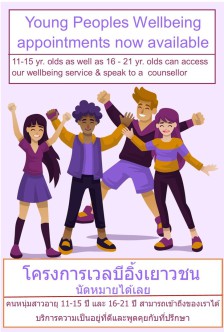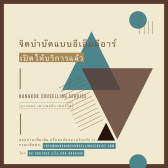Bangkok Counselling Service
What is counselling?
Counselling is the term often given to support that you can get from a person who is trained to help you understand a problem that you have. It usually involves talking about something that is bothering you, though you can usually use it to talk about anything you want to talk about.
Who are counsellors?
Counsellors are people who are trained to help with problems and feelings of their clients. We come from all groups in the community. You may want a counsellor that is the same or different gender, race, or sexuality as yourself - it is perfectly acceptable to request this.
What training do counsellors have?
Counsellors are required to spend a minimum of 2 years and psychotherapists a minimum of 4 years training which meet standards set by regulating bodies. They must also have their work supervised by a professional registered with the regulating body. You can ask your counsellor or psychotherapist what training he/ she has had and whether he/she is accredited with the BACP or UKCP (for UK therapists).
Does the supervisor sit in the room?
No. The supervisor doesn’t sit in the room or know who you are. The counselling session is confidential. The counsellor meets with the supervisor to talk about the work she/he is doing. You should check that your counsellor is in regular supervision.
What if I have already tried counselling and didn’t like it?
You might want to think about what it was that you didn’t like. If it was the counsellor, that is ok. Sometimes you may have to meet a few people before you find a counsellor you feel comfortable enough to talk about what is bothering you with. It could also be the type of counselling that you had. You may want to try a different type.
Are there different types of counselling?
Yes there are several types of counselling, ranging from ones that are directed by the counsellor to ones that are directed by you. Some counselling involves doing things such as running around or drama or painting. There are also different types of counsellors and this means trying to find a balance between the person and the approach that they offer.
How much does counselling cost?
The cost of counselling varies. Sometimes you can get it free from counselling projects or charities/ NGO's that have been set up to meet the needs of specific groups of people such as young people, people with a particular illness, minority groups, people who have suffered a bereavement etc. You could also get a referral from your doctor and this may or may not cost. The cost of private counselling varies and it is a good idea to enquire about the cost when you first make contact.
How long does counselling last for?
Each session is usually 50 to 60 minutes in length. It is usual to meet with your counsellor once a week though sometimes it could be more or less frequent. You may also agree a set the number of sessions. If counselling is through a counselling project or via your GP it is likely that there may be a maximum number of sessions offered to you.
What is the difference between Counselling and Psychotherapy?
In practise there is little difference. Some people refer to counselling as support around a specific issue and psychotherapy as support that is ongoing. Other people make the distinction in relation to the theoretical background on which the support is based, counselling evolving from the client-centred approach and psychotherapy evolving from psychoanalysis.
Can I try counselling before agreeing to go every week?
Yes. Most counsellors will also want to meet you first before offering you a set number of sessions, this is often called an assessment session. This is an opportunity for you to ask the counsellor any questions you have and the counsellor will ask you some questions. You will also be able to say why you want counselling. You should not feel that you are being interviewed; you need to decide if you feel that the counsellor is the person that can give you the support you are looking for. The counsellor will also decide if she/he is able to offer you that support. If you agree to work together it is usual to agree a set number of sessions at this point.
What questions can I ask?
You can ask any questions you want, though the counsellor may not want to answer those of a personal nature. If you want a counsellor who is the same gender or sexuality as you it might be best to ask that question when you book the appointment so that you know the answer.
What is confidentiality?
Anything that you talk about in the counselling session will not be passed on to other people and the counsellor is professionally obliged not to disclose information that you give her/him. There are a few exceptions. If your counsellor believes that you intend to harm yourself or another person he/ she has an obligation to let someone know. Though this would usually be discussed with you first. You do not have to adhere to the same confidentiality. The counselling session belongs to you and you can discuss it and how it went with whomever you want.
Will counselling make me feel better?
Counselling will probably make you feel a lot of things. At times you may feel worse than you did before you went for counselling, this may happen because you bring something that you put in the back of your mind into the present again. With the help of your counsellor you will be able to look at that issue pull it apart and learn to deal with it. You may then feel better.
What happens if I miss a session?
If you miss a session, you miss out on that time for yourself. If you are unable to attend a session you should let your counsellor know as soon as possible. If you decide not to go to counselling on one particular week because you are frightened or because you got upset in the previous session it would be helpful to let your counsellor know this. Missing sessions is something that is usually discussed when you first meet a counsellor.
What happens when I want to stop going to counselling?
Some counselling is for a set period of time such as six or twelve weeks, sometimes this can be extended for another six or twelve weeks. It is also possible to agree to different numbers of sessions. In these cases there will be a planned ending. Sometimes counselling can be open ended where you go every week without a definite finishing date. If you know in advance that you want to stop having counselling you should let the counsellor know so that you both can bring the counselling relationship to a close and you can consider what, if any support you will need once you stop having counselling. All counselling relationships end at some point so you should not feel guilty saying that you want to end. Often people stop counselling for periods and return at a later stage if they need this type of support again.
We designed this page from the questions we are most often asked by people who are considering counselling. We hope it goes some way towards answering yours. If you have other further questions you would like to ask, or if you think it would be useful for a specific question to be included on this page please feel free to email us. The purpose of this page is to demystify counselling and psychotherapy and make it more accessible to everyone. If as a result of reading it, you decide to proceed with counselling regardless of who you go to, then this page has done the job we wrote it for. The answers to questions on this page are general and you may find that some counsellors work in a different way. Only work with what feels comfortable and ok for you. It is perfectly alright to visit several counsellors before deciding on the one you want to work with. Thank you for reading.









